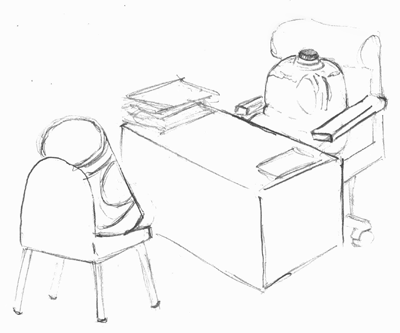Float
1. Floating about you see some nice blobby things to settle on. Because you have no appendages, you have no choice but to keep floating. Choices: [ Keep Floating ]
2. [ Keep Floating ] Ah, you’re still floating, those blobs are getting closer. Choices: [ Keep Floating ]
3. [ Keep Floating ] Well, this is getting a bit boring, isn’t it. Choices: [ Keep Floating ]
4. [ Keep Floating ] You land! On one of those blobs. Choices: [ Give blob instructions ] OR [ Float away ]
5. [ Give blob instructions ] You give it some instructions mostly on how to create more of you. Well, it’s less giving instructions and more of injecting yourself into the blob. You do enjoy reproduction and propagation, just like everyone else. Choices: [ Reproduction and propagation! ]
5. [ Float away ] You float for a very long time, but you don’t particularly notice, it’s just the day-to-day flow of things. You manage to land on a blocky thing. Choices: [ Give blob instructions ] OR [ Float away ]
6. [ Reproduction and propagation! ] In that little factory of a blob, many more of you are produced. Such a good little blob. Now from one, you are many. Choices: [ Keep at that reproduction ] OR [ Float away ]
General concept is that you’re a virus; the end game is finding out what kind of virus you are / infecting an entire species to extinction.
Sink
General concept is parallel with Float from the opposite side. You’re trying to retain (sink) as many alleles as possible in the gene pool. End game is either defeating all other species, extinction, finding out what species you are, or discovering the virus(es) plaguing the your species and stopping it if possible.
Community Tricycle
1. Who the %#*& rides a tricycle anymore? Your owner and master does. Yes, he is a 11-year-old fat ass about to start his first day of middle school and get the @!*# kicked out of him for riding a trikie. Well, it keeps the wheels oiled, so you’re not going to complain too much. Choices: [ Give Mr. Fatty 6th grader a ride to school ] OR [ Do nothing ] OR [ Play dead ].
2. [ Give Mr. Fatty 6th grader a ride to school ] You struggle under the weight of this seriously obese kid. You’re glad he’s getting some exercise to work off the weight, but this is a pretty sucky job. He parks you at the bike rack and heads to classes. Choices: [ Ditch the kid ] OR [ Do nothing (1) ] OR [ Play dead ]
2. [ Do nothing ] You did nothing. Happy? Choices: [ Give Mr. Fatty 6th grader a ride to school ] OR [ Do nothing (2) ] OR [ Play dead ]
2. [ Play dead ] You loosen a chain so that it looks like the bike doesn’t work. The kid complains to mom and dad that his trikie is broken. They offer
3. [ Do nothing (2) ] Your kid is confused because his tricycle looks fine, but it just won’t budge. It occurs to him that he might be too fat and the amount of force he’s applying just can’t power through the weight of his own body. Giving up, he walks to school instead.
General concept is that you are the awkward “maybe” in conversation, the middle ground, the wishy-washy gray area. Just like a community tricycle, everyone gets a ride on “Maybe” and general apathetic do nothing. End game is becoming a bicycle or unicycle or motorbike.

